Introduction
People’s identity is tied to their appearance, which makes significant hair loss at any age or gender devastating, but can nutritional supplements help?
Those experiencing different types of hair loss are often desperate to find a solution, and there is no shortage of lotions, potions, and pills promising new hair growth. Are these safe and effective, or are they simply “snake oil”? This article is about evidence-based nutritional supplements that may help restore hair loss, depending on its cause. It’s important to keep in mind that nutrient needs between people differ, so supplementation is not one-size-fits-all.
Androgenic Alopecia
Androgenic alopecia is commonly known as “male pattern baldness” or “female pattern baldness,” and the leading cause of it is an androgenic hormone known as dihydrotestosterone (DHT). DHT binds to the hair follicle, causing it to shrink, and eventually, the hair stops growing entirely. Some nutritional supplements positively affect DHT and help support hair growth, but many “hair growth nutritional supplements” contain ingredients for which evidence of benefit is lacking.
A study at an alopecia clinic [1] found that 81% of the patients were female, and 63% of them used nutritional supplements, compared to the US average of 40% [2]. The most common hair loss supplements used include biotin, vitamin B12, and B-complex multivitamin. While taking these nutritional supplements may seem benign, biotin is well-known to interfere with diagnostic tests for Thyroid Stimulating Hormone (TSH). The implication of this is that people taking biotin-containing supplements to self-treat hair loss without first being evaluated for a thyroid disorder may result in missing the diagnosis and underlying cause of their hair loss. In addition to interfering with diagnostic tests, some ‘hair loss nutritional supplements’ may be toxic in high doses [3].
A systematic review recently published in JAMA Dermatology (Drake et al., 2023) evaluated the effectiveness of nutritional supplements for treating hair loss in people without nutritional deficiency [4]. This article is based on this current systematic review.
Three Main Types of Hair Loss
There are three main types of hair loss: telogen effluvium, androgenic alopecia (AGA), and alopecia areata (AA).
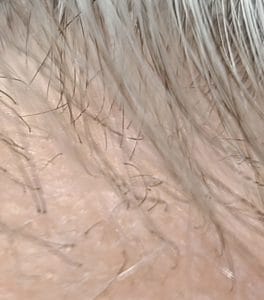 Telogen effluvium (TE) is the most common form of diffuse hair loss [5] and usually occurs after a profound stress, shock, or traumatic event, including childbirth, a thyroid disorder, or rapid weight loss. This type of hair loss was covered in an earlier article. But TE is not the only type of hair loss in hypothyroidism. In a study of more than 1200 people with thyroid disorder, half (50%) of people aged 40 years old and older had either alopecia areata or androgenetic alopecia [6].
Telogen effluvium (TE) is the most common form of diffuse hair loss [5] and usually occurs after a profound stress, shock, or traumatic event, including childbirth, a thyroid disorder, or rapid weight loss. This type of hair loss was covered in an earlier article. But TE is not the only type of hair loss in hypothyroidism. In a study of more than 1200 people with thyroid disorder, half (50%) of people aged 40 years old and older had either alopecia areata or androgenetic alopecia [6].
 Androgenic alopecia (AGA) affects up to 50% of men and women. In men, it is called ‘male pattern baldness’ and is mainly seen on the crown of the head and the temples. In women, it is called ‘female pattern baldness’ and is primarily seen at the crown of the head, with a broader center part. Androgenic alopecia is a genetic disorder that involves both maternal and paternal genes [7].
Androgenic alopecia (AGA) affects up to 50% of men and women. In men, it is called ‘male pattern baldness’ and is mainly seen on the crown of the head and the temples. In women, it is called ‘female pattern baldness’ and is primarily seen at the crown of the head, with a broader center part. Androgenic alopecia is a genetic disorder that involves both maternal and paternal genes [7].
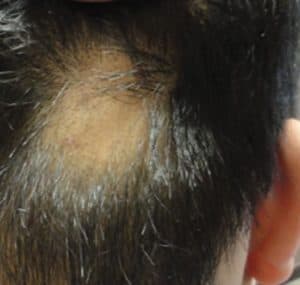 Alopecia areata (AA) is an autoimmune disorder where the body’s immune system attacks the follicles. As a result, hair often comes out in clumps, usually the size and shape of a quarter, but it can affect more expansive areas of the scalp [8]. It can occur in those with other autoimmune conditions, including thyroid disease.
Alopecia areata (AA) is an autoimmune disorder where the body’s immune system attacks the follicles. As a result, hair often comes out in clumps, usually the size and shape of a quarter, but it can affect more expansive areas of the scalp [8]. It can occur in those with other autoimmune conditions, including thyroid disease.
Dihydrotestosterone (DHT) as a Main Cause of Hair Loss
One of the main contributors to androgenetic alopecia is the male hormone called dihydrotestosterone (DHT). DHT is made by an enzyme called 5 alpha-reductase (5-AR) acting on testosterone. When DHT binds to the receptors in the hair follicles, it causes the follicles to shrink, shortening their life span. Eventually, these follicles shrink so much that they stop producing hair. DHT can be suppressed by medications such as Finasteride®, which lowers levels of DHT.
(Minoxidil® is a hair loss medication that works by an entirely different mechanism. It acts as a vasodilator, increasing blood flow in the scalp by making blood vessels wider to encourage regrowth.)
While androgens such as DHT contribute to baldness by their detrimental effect on hair follicles in the scalp, they are also a key player in hair growth. This is known as the androgen paradox.
Nutritional Supplements – 5-α Reductase (5-AR) Inhibitors
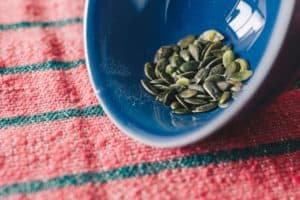 Pumpkin seed oil is known to be effective in treating benign prostate hyperplasia (BPH) because it acts as a 5-AR inhibitor [9,10]. In a 2014 study, one group of subjects took a 400 mg capsule of pumpkin seed oil each day for 24 weeks. This group showed significantly superior hair growth, with a mean hair count increase of 40% compared to 10% in the placebo-treated men [10].
Pumpkin seed oil is known to be effective in treating benign prostate hyperplasia (BPH) because it acts as a 5-AR inhibitor [9,10]. In a 2014 study, one group of subjects took a 400 mg capsule of pumpkin seed oil each day for 24 weeks. This group showed significantly superior hair growth, with a mean hair count increase of 40% compared to 10% in the placebo-treated men [10].
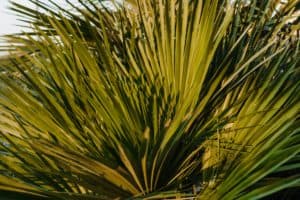 A two-year randomized control study of 100 male patients with mild to moderate androgenic alopecia took either 320 mg of Saw Palmetto nutritional supplement extract daily for 24 months, or 1 mg Finasteride daily. While Finasteride was more effective at slowing hair loss, the Saw Palmetto extract did stabilize hair loss at the 24-month mark [12].
A two-year randomized control study of 100 male patients with mild to moderate androgenic alopecia took either 320 mg of Saw Palmetto nutritional supplement extract daily for 24 months, or 1 mg Finasteride daily. While Finasteride was more effective at slowing hair loss, the Saw Palmetto extract did stabilize hair loss at the 24-month mark [12].
The Role of Specific Micronutrients in Restoring Hair Loss
Lower levels of Vitamin D, or vitamin D deficiency, have been associated with all three forms of hair loss [13-15]. A small 2021 study supplemented women with telogen effluvium with very high oral vitamin D3 and reported that more than 80% had improved results [16]. Before beginning supplementation, it is prudent to assess vitamin D status through blood tests.
A deficiency of Zinc is associated with telogen effluvium, and lower zinc levels have been observed in people with alopecia areata [17-19]. Two small studies of zinc sulfate supplementation both reported benefits at three months [20,21]. Good sources of zinc include red meat, poultry, and seafood such as oysters and crab.
Vitamin B12 is necessary for DNA synthesis. A 2018 study of people with telogen effluvium showed that after four months, 90% of subjects who received B12 treatment had a significant decrease in hair shedding [23].
The Role of Antioxidants
Oxidative stress is thought to play a role in all three types of hair loss. A 2015 randomized controlled study compared a supplement containing omega-3 from fish oil, omega-6 from blackcurrant seed oil, and the antioxidants lycopene, vitamin C, and vitamin E against no supplement. The intervention group had significantly increased hair density and thickness at six months [27].
Final Thoughts…
Nutritional supplements can be very helpful if used correctly, but taken in the wrong dosage, they can interfere with medication absorption or result in toxicity. It is best that before people begin using dietary supplements to self-treat hair loss, they discuss this with a knowledgeable healthcare professional, such as a doctor or Registered Dietitian.
More Info
Learn about me, and if you would like more information on how I can help assess your dietary intake and nutrient status, please view the Comprehensive Dietary Package.
To your good health!
Joy
You can follow me on:
Twitter: https://twitter.com/jyerdile
Facebook: https://www.facebook.com/BetterByDesignNutrition/
References
- Burns, L. J., & Senna, M. M. (2020). Supplement use among women experiencing hair loss. International Journal of Women’s Dermatology, 6(3), 211. [https://pubmed.ncbi.nlm.nih.gov/32637548/]
- Kantor, E. D., et al. (2016). Trends in dietary supplement use among US adults from 1999-2012. JAMA, 316(14), 1464-1474. [https://pubmed.ncbi.nlm.nih.gov/27727387/]
- Ronis, M. J. J., et al. (2018). Adverse effects of nutraceuticals and dietary supplements. Annual Review of Pharmacology and Toxicology, 58, 583-601. [https://pubmed.ncbi.nlm.nih.gov/28992429/]
- Drake, L. E., et al. (2023). Evaluation of the Safety and Effectiveness of Nutritional Supplements for Treating Hair Loss: A Systematic Review. JAMA Dermatology, 159(1), 79-86. [https://pubmed.ncbi.nlm.nih.gov/36449298/]
- Malkud, S. (2015). Telogen Effluvium: A Review. Journal of Clinical and Diagnostic Research, 9(9), WE01-WE3. [https://pmc.ncbi.nlm.nih.gov/articles/PMC4606321/]
- Vincent, M., & Yogiraj, K. (2013). A descriptive study of alopecia patterns and their relation to thyroid dysfunction. International Journal of Trichology, 5(1), 57-60. [https://pmc.ncbi.nlm.nih.gov/articles/PMC3746235/]
- Ho, C. H., et al. (2021). Androgenetic Alopecia. StatPearls Publishing. [https://www.ncbi.nlm.nih.gov/books/NBK430924/]
- Medical News Today. (2022). Alopecia areata: Causes, diagnosis and treatments. [https://www.medicalnewstoday.com/articles/70956]
- Hong, H., et al. (2009). Effects of pumpkin seed oil and saw palmetto oil in Korean men with symptomatic benign prostatic hyperplasia. Nutrition Research and Practice, 3(4), 323-327. [https://pmc.ncbi.nlm.nih.gov/articles/PMC2809240/]
- Cho, Y. H., et al. (2014). Effect of pumpkin seed oil on hair growth in men with androgenetic alopecia. Evidence-Based Complementary and Alternative Medicine, 2014, 549721. [https://pmc.ncbi.nlm.nih.gov/articles/PMC4017725/]
- Prager, N., et al. (2002). A randomized, double-blind, placebo-controlled trial to determine the effectiveness of botanically derived inhibitors of 5-alpha-reductase in the treatment of androgenetic alopecia. Journal of Alternative and Complementary Medicine, 8(2), 143-152. [https://pubmed.ncbi.nlm.nih.gov/12006122/]
- Rossi, A., et al. (2012). Comparative effectiveness of finasteride vs Serenoa repens in male androgenetic alopecia: a two-year study. International Journal of Immunopathology and Pharmacology, 25(4), 1167-1173. [https://pubmed.ncbi.nlm.nih.gov/23298508/]
- Banihashemi, M., et al. (2016). Serum vitamin D3 level in patients with female pattern hair loss. International Journal of Trichology, 8(3), 116-120. [https://pmc.ncbi.nlm.nih.gov/articles/PMC5007917/]
- Rasheed, H., et al. (2013). Serum ferritin and vitamin D in female hair loss: do they play a role? Skin Pharmacology and Physiology, 26(2), 101-107. [https://pubmed.ncbi.nlm.nih.gov/23428658/]
- Lee, S., et al. (2018). Increased prevalence of vitamin D deficiency in patients with alopecia areata: a systematic review and meta-analysis. Journal of the European Academy of Dermatology and Venereology, 32(7), 1214-1221. [https://pubmed.ncbi.nlm.nih.gov/29512871/]
- Sattar, F., et al. (2021). Efficacy of oral vitamin D3 therapy in patients suffering from diffuse hair loss. Journal of Nutritional Science and Vitaminology, 67(1), 68-71. [https://pubmed.ncbi.nlm.nih.gov/33632948/]
- Thompson, J. M., et al. (2017). The Role of micronutrients in alopecia areata: a review. American Journal of Clinical Dermatology, 18(5), 663-679. [https://pubmed.ncbi.nlm.nih.gov/28608253/]
- Abdel Fattah, N. S., et al. (2016). Evaluation of serum zinc level in patients with newly diagnosed and resistant alopecia areata. International Journal of Dermatology, 55(1), 24-29. [https://pubmed.ncbi.nlm.nih.gov/26330452/]
- Ead, R. D. (1981). Oral zinc sulphate in alopacia areata-a double blind trial. British Journal of Dermatology, 104(4), 483-484. [https://pubmed.ncbi.nlm.nih.gov/7225299/]
- Sharquie, K. E., et al. (2012). Oral zinc sulphate in treatment of alopecia areata (double blind; cross-over study). Journal of Clinical & Experimental Dermatology Research, 3(150). [https://www.longdom.org/open-access/oral-zinc-sulphate-in-treatment-of-alopecia-areata-double-blind-crossover-study-2155-9554.1000150.pdf]
- Daly, T., & Daly, K. (2018). Telogen effluvium with dysesthesia (TED) has lower B12 levels and may respond to B12 supplementation. Journal of Drugs in Dermatology, 17(11), 1236-1240. [https://pubmed.ncbi.nlm.nih.gov/30481965/]
- Prie, B. E., et al. (2016). Oxidative stress in androgenetic alopecia. Journal of Medicine and Life, 9(1), 79-83. [https://pmc.ncbi.nlm.nih.gov/articles/PMC5152608/]
- Le Floc’h, C., et al. (2015). Effect of a nutritional supplement on hair loss in women. Journal of Cosmetic Dermatology, 14(1), 76-82. [https://pubmed.ncbi.nlm.nih.gov/25573277/]
- Beoy, L. A., et al. (2010). Effects of tocotrienol supplementation on hair growth in human volunteers. Tropical Life Sciences Research, 21(2), 91-99. [https://pmc.ncbi.nlm.nih.gov/articles/PMC3819075/]
- Sutter, M. E., et al. (2008). Selenium toxicity: a case of selenosis caused by a nutritional supplement. Annals of Internal Medicine, 148(12), 970-971. [https://pubmed.ncbi.nlm.nih.gov/18559850/]
- Park, D. W., et al. (2020). Do kimchi and cheonggukjang probiotics as a functional food improve androgenetic alopecia? World Journal of Men’s Health, 38(1), 95-102. [https://pmc.ncbi.nlm.nih.gov/articles/PMC6944354/]
- Harada, N., & Okajima, K. (2007). Effect of topical application of capsaicin on dermal insulin-like growth factor-I levels. Growth Hormone & IGF Research, 17(2), 171-176. [https://pubmed.ncbi.nlm.nih.gov/17307374/]
- FDA. (2022). Questions and Answers on Dietary Supplements. [https://www.fda.gov/food/information-consumers-using-dietary-supplements/questions-and-answers-dietary-supplements]
- Health Canada. (2014). Natural Health Products Program Quarterly Snapshot. [https://www.canada.ca/en/health-canada/services/drugs-health-products/natural-non-prescription/activities/quarterly-snapshot-quarter-1-2014-2015.html]
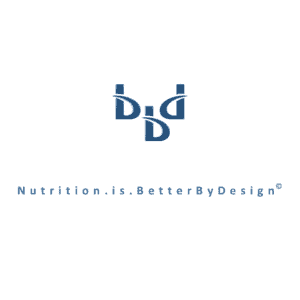
© 2025 BetterByDesign Nutrition Ltd.

Joy is a Registered Dietitian Nutritionist and owner of BetterByDesign Nutrition Ltd. She has a postgraduate degree in Human Nutrition, is a published mental health nutrition researcher, and has been supporting clients’ needs since 2008. Joy is licensed in BC, Alberta, and Ontario, and her areas of expertise range from routine health, chronic disease management, and digestive health to therapeutic diets. Joy is passionate about helping people feel better and believes that Nutrition is BetterByDesign©.
